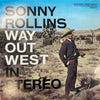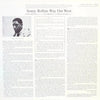



Sonny Rollins – Way Out West (2LP, 45RPM, unsealed, Number 0681)
RARITY - Unsealed (mint conditions)
Tenor Saxophone – Sonny Rollins [click here to see more vinyl featuring Sonny Rollins]
Bass – Ray Brown [click here to see other vinyl featuring Ray Brown]
Drums – Shelly Manne [click here to see more vinyl featuring Shelly Manne]
Written by Johnny Mercer (A1), Eddie DeLange (A2), Duke Ellington (A2), Irving Mills (A2), Sonny Rollins (B1, D2), Peter DeRose (C1), Billy Hill (C1), Isham Jones (D1), Marty Symes (D1)
2 LP, Standard sleeve
Limited numbered Edition – Number 0681
Original analog Master Tape : YES
Heavy Press : 180 g
Record Color : Black
Speed : 45 RPM
Size : 12’’
Stereo
Studio
Record Press: Record Technology Incorporated (RTI)
Label : Analogue Productions - Fantasy 45 Series
Original Label : Contemporary Records
Recorded March 7, 1957 at Contemporary Records Studio (Los Angeles)
Engineered by Roy DuNann
Produced by Lester Koenig
Mastered by Bernie Grundman at AcousTech Mastering
Liner Notes by Lester Koenig
Photography by Lester Koenig
Originally released in 1957
Reissued in 2002
Tracks :
Side A:
- I'm An Old Cowhand
- Solitude
Side B:
- Come, Gone
Side C:
- Wagon Wheels
Side D:
- There Is No Greater Love
- Way Out West
Reviews :
“The timeless Way out West established Sonny Rollins as jazz's top tenor saxophonist (at least until John Coltrane surpassed him the following year). Joined by bassist Ray Brown and drummer Shelly Manne, Rollins is heard at one of his peaks on such pieces as "I'm an Old Cowhand (From the Rio Grande)," his own "Way out West," "There Is No Greater Love," and "Come, Gone" (a fast stomp based on "After You've Gone"). The William Claxton photo of Rollins wearing Western gear (and holding his tenor) in the desert is also a classic.” AllMusic. Review by Scott Yanow.
"Way Out West was Sonny Rollins’ first tenor saxophone-bass-drums recording. He would follow this with the trio recordings A Night at the Village Vanguard (Blue Note, 1999) and Freedom Suite (Riverside/OJC, 1991). Unlike the piano-less quartets of Gerry Mulligan, Rollins did not have a counterpoint foil, as did Mulligan did in Chet Baker and later Bob Brookmeyer. The tenor trio format is full of wide-open spaces. How appropriate that this format would be chosen my Rollins for a recording entitled Way Out West.
Where the recently remastered Tenor Madness clocks in at just over 35 minutes with no alternate takes, Way Out West soars to over 70 minutes with three alternate takes, two of which are twice as long as the released versions. I suspect we can forgive the brevity of Tenor Madness for the presence of Rollins and Coltrane playing the blues, but it is very nice to have an expanded Way Out West. "I’m an Old Cowhand" gets a short and extended treatment, both worthy of inclusion and release. Shelly Manne’s John Ford Western soundtrack drumming is perfect without making the song a parody. Ray Brown supplies the time and foundation over which Rollins freely improvises, taking full advantage of the space afforded him. "The Two versions of "Come, Gone" do the same thing.
Sonny Rollins’ playing is immediately attractive because of his muscular harmonic conservatism. Where he might have never have licked every scalar corner in existence as Coltrane did, he does always perform at the highest level. Way Out West remains a standard for this higher level.." All About Jazz Review y C. Michael Bailey.
Ratings :
Discogs : 5 / 5 , AllMusic : 5 / 5 , The Penguin Guide to Jazz Recordings : 3.5 / 4 ; The Rolling Stone Jazz Record Guide : 5 / 5




